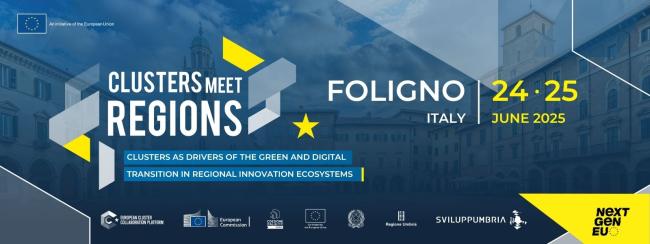
Description
Clusters as Drivers of the Green and Digital Transition in Regional Innovation Ecosystems
Focus on Aerospace, E-Mobility and Nautical Innovation in Umbria
The Clusters Meet Regions event in Foligno (Umbria), on 24–25 June 2025, explored how clusters contribute to regional industrial transformation, exploring how they can support the green and digital transitions, in the aerospace, e-mobility, and nautical sectors.
Organised by Sviluppumbria in collaboration with the Umbria Region, and the European Cluster Collaboration Platform (ECCP) on behalf of the European Commission, the event highlighted how regional strategies support cluster-based innovation, decarbonisation, and competitiveness, in alignment with Umbria’s Smart Specialisation Strategy (S3).
The event will demonstrate how the Umbria Region and Sviluppumbria foster a strong innovation ecosystem by:
Encouraging partnerships and building connections between startups, big companies, research institutions, and regional entities.
Financing R&D projects and the creation of new enterprises to boost economic growth and competitiveness
Boosting internazionalization, innovation and intersectorial technologies to support clusters
Ensure Access to Markets facilitating connections between local innovators and international markets to help products and services scale.
Invest in Talent Development working with universities and technical schools to develop skills
Exploiting technology and digital infrastructure, promoting the use of data analytics
A key focus of the programme was on hydrogen as a central technology for decarbonisation, within the broader context of EU energy and climate objectives. The event served as a platform to reflect on the European hydrogen strategy and showcase regional initiatives that contribute to its implementation.
In addition, the programme featured case studies from Umbrian clusters, success stories in European cooperation, and site visits to innovative local enterprises. Participants also explored the wider ecosystem of support services, including international cluster collaboration, the Enterprise Europe Network (EEN), and the role of regional development agencies in scaling innovation.
🗓️ Final agenda
📃Read the Input Paper on the cluster landscape and innovation ecosystem of the Italian region of Umbria.
Presented materials in the frame of the event:
CONTEXT
THE CLUSTERS MEET REGIONS SERIES
EU regions need to be able to compete with other more advanced and emerging economies in the fast changing economic and social environment, in particular in the post-Covid-19 recovery period. Clusters develop more easily in urban and regional ecosystems with a favourable administrative and regulatory environment and access to skilled labour, markets, financial and business support services.
What really matters is the involvement of clusters in regional economic governance, in policy design and implementation at regional level.
Regional authorities need to know their clusters and understand how they can shape, improve and effectively help in the design and the implementation of regional development policies. On the other hand, cluster organisations and their members should take actions and implement projects that are relevant for the economic development of their local communities. They should engage in collaboration with other European clusters in the same or related economic activities and thus complement regional assets and reinforce capacities to lead green transition, accelerate digital transition and build resilience.
The “Clusters meet Regions” workshops bring together clusters and policymakers of the EU, national, regional and local level to learn from each other on how to better use clusters to strengthen industrial ecosystems, serve national/regional economic development and liaise with other regions with similar transition challenges.
FOCUS AREA
- Decarbonisation and hydrogen technologies in industrial ecosystems
- Strategic development of the aerospace, mobility, and nautical clusters
- EU and regional funding instruments for innovation and transformation
- The role of skills, entrepreneurship, and business support in S3 implementation
- Internationalisation and interregional cooperation models
TARGET AUDIENCE
This event brought together:
- Regional and national cluster organisations
- SMEs, large companies, and technology providers
- Regional development agencies, innovation hubs, and DIHs
- Public authorities, managing authorities, and S3 policymakers
- EU institutions, networks and project consortia
- Investors, business angels, and financing intermediaries
AGENDA OVERVIEW
Read and download the final agenda